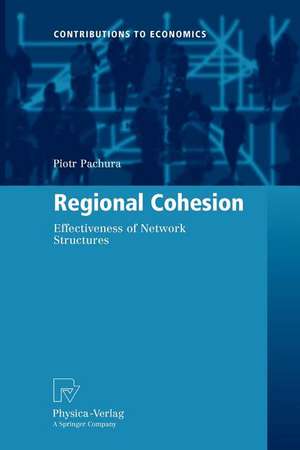Regional Cohesion: Effectiveness of Network Structures: Contributions to Economics
Autor Piotr Pachuraen Limba Engleză Paperback – mar 2012
| Toate formatele și edițiile | Preț | Express |
|---|---|---|
| Paperback (1) | 632.37 lei 6-8 săpt. | |
| Physica-Verlag HD – mar 2012 | 632.37 lei 6-8 săpt. | |
| Hardback (1) | 637.59 lei 6-8 săpt. | |
| Physica-Verlag HD – 2 dec 2009 | 637.59 lei 6-8 săpt. |
Din seria Contributions to Economics
- 18%
 Preț: 1109.92 lei
Preț: 1109.92 lei - 24%
 Preț: 657.06 lei
Preț: 657.06 lei - 15%
 Preț: 649.06 lei
Preț: 649.06 lei -
 Preț: 283.93 lei
Preț: 283.93 lei - 18%
 Preț: 1027.83 lei
Preț: 1027.83 lei -
 Preț: 90.83 lei
Preț: 90.83 lei - 18%
 Preț: 1001.81 lei
Preț: 1001.81 lei - 17%
 Preț: 361.01 lei
Preț: 361.01 lei -
 Preț: 307.42 lei
Preț: 307.42 lei - 15%
 Preț: 644.95 lei
Preț: 644.95 lei - 15%
 Preț: 638.24 lei
Preț: 638.24 lei -
 Preț: 394.29 lei
Preț: 394.29 lei - 15%
 Preț: 636.80 lei
Preț: 636.80 lei - 15%
 Preț: 637.78 lei
Preț: 637.78 lei - 18%
 Preț: 723.69 lei
Preț: 723.69 lei - 15%
 Preț: 635.47 lei
Preț: 635.47 lei - 15%
 Preț: 634.00 lei
Preț: 634.00 lei -
 Preț: 392.75 lei
Preț: 392.75 lei -
 Preț: 383.33 lei
Preț: 383.33 lei - 15%
 Preț: 637.28 lei
Preț: 637.28 lei - 15%
 Preț: 636.80 lei
Preț: 636.80 lei - 18%
 Preț: 950.96 lei
Preț: 950.96 lei - 15%
 Preț: 634.68 lei
Preț: 634.68 lei -
 Preț: 387.38 lei
Preț: 387.38 lei - 15%
 Preț: 647.27 lei
Preț: 647.27 lei - 15%
 Preț: 636.63 lei
Preț: 636.63 lei - 15%
 Preț: 639.73 lei
Preț: 639.73 lei -
 Preț: 385.62 lei
Preț: 385.62 lei - 15%
 Preț: 641.85 lei
Preț: 641.85 lei - 20%
 Preț: 649.60 lei
Preț: 649.60 lei - 15%
 Preț: 641.71 lei
Preț: 641.71 lei -
 Preț: 387.96 lei
Preț: 387.96 lei - 15%
 Preț: 645.47 lei
Preț: 645.47 lei -
 Preț: 385.08 lei
Preț: 385.08 lei - 15%
 Preț: 646.62 lei
Preț: 646.62 lei -
 Preț: 383.33 lei
Preț: 383.33 lei - 15%
 Preț: 638.43 lei
Preț: 638.43 lei -
 Preț: 381.21 lei
Preț: 381.21 lei - 15%
 Preț: 642.51 lei
Preț: 642.51 lei - 15%
 Preț: 637.78 lei
Preț: 637.78 lei - 15%
 Preț: 641.71 lei
Preț: 641.71 lei -
 Preț: 384.70 lei
Preț: 384.70 lei -
 Preț: 379.86 lei
Preț: 379.86 lei -
 Preț: 378.34 lei
Preț: 378.34 lei -
 Preț: 384.70 lei
Preț: 384.70 lei -
 Preț: 388.52 lei
Preț: 388.52 lei - 15%
 Preț: 641.71 lei
Preț: 641.71 lei -
 Preț: 381.00 lei
Preț: 381.00 lei - 15%
 Preț: 644.95 lei
Preț: 644.95 lei -
 Preț: 386.00 lei
Preț: 386.00 lei
Preț: 632.37 lei
Preț vechi: 743.97 lei
-15% Nou
Puncte Express: 949
Preț estimativ în valută:
121.02€ • 124.85$ • 102.42£
121.02€ • 124.85$ • 102.42£
Carte tipărită la comandă
Livrare economică 04-18 martie
Preluare comenzi: 021 569.72.76
Specificații
ISBN-13: 9783790828092
ISBN-10: 3790828092
Pagini: 132
Ilustrații: IX, 120 p. 31 illus.
Dimensiuni: 155 x 235 x 7 mm
Greutate: 0.2 kg
Ediția:2010
Editura: Physica-Verlag HD
Colecția Physica
Seria Contributions to Economics
Locul publicării:Heidelberg, Germany
ISBN-10: 3790828092
Pagini: 132
Ilustrații: IX, 120 p. 31 illus.
Dimensiuni: 155 x 235 x 7 mm
Greutate: 0.2 kg
Ediția:2010
Editura: Physica-Verlag HD
Colecția Physica
Seria Contributions to Economics
Locul publicării:Heidelberg, Germany
Public țintă
ResearchCuprins
– Thesis and Research Methodology.- Clustering and Networking in Regional Policy.- Cluster and Network Approach in Regional Development.- Regional Disparities in EU.- Regional Clustering Based on Efficiency and Networking Models.
Textul de pe ultima copertă
This book presents an interdisciplinary analysis of EU regional cohesion based on a network and clusters approach. The author explores the question if and how the presence of network structures supports the effectiveness of transformation in EU regions, in particular with a focus on non-pecuniary factors of regional growth. For a theoretical foundation of the topic, characteristics of a networking economy as well as the determinants of EU policies on regional development and innovation are examined and discussed. The empirical analysis at the core of this work presents and makes use of interdisciplinary methodological tools such as Data Envelopment Analysis (DEA), K-means models and self-organizing maps.
Caracteristici
Includes supplementary material: sn.pub/extras
















